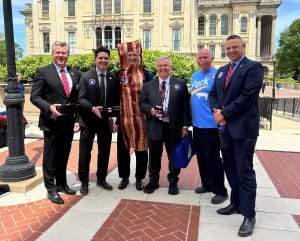Biden unveils $2.25t infrastructure plan
Legislative Watch: Legislative Watch: Federal court stops increased line speeds; Delay ELD enforcement; Deputy under secretary for food safety named.

President Joe Biden unveiled this week his $2.25 trillion infrastructure plan, "The American Jobs Plan," that makes major investments in highways, bridges, electric grid, broadband, and waterways.
The administration is advocating that rebuilding the nation's infrastructure will lead to an economic boom. President Biden said in announcing the plan in Pittsburg, "It will create millions of jobs, good-paying jobs. It will grow the economy, make us more competitive around the world, promote our national security interests and put us in a position to win the global competition with China in the upcoming years."
The proposal is facing Republican opposition because of the various business tax code changes, including raising the corporate rate from 21% to 28%, which will be used to pay for the plan.
The plan includes $621 billion for transportation, including roads, bridges, and waterways. It provides $115 billion to modernize 20,000 miles of highways and roads and rebuild 10,000 of the nation's most fragile smaller bridges. The White House said one in five miles of the nation's highways and major roads is in "poor" condition, as well as 45,000 bridges. The proposal includes $17 billion for inland waterways, ports and ferries.
There are investments in critical services such as water, broadband and electricity. The plan allocates $111 billion for clean and safe drinking water, including replacing 100% of the nation's lead pipes and service lines and upgrading and modernizing drinking water, wastewater, and stormwater systems. It includes $100 billion for broadband to ensure the entire country has access. It allocates $100 billion to update the electrical grid.
Federal court stops increased line speeds for pork
U.S. District Judge Joan Ericksen in Minnesota ruled in the case "United Food and Commercial Workers Union, Local No. 663 v. U.S. Department of Agriculture" that USDA acted unlawfully when it eliminated limits on the speeds at which plants run their slaughter lines for pork without considering the increased risk of injury to plant workers.
Erickson vacated the provision of the 2019 "New Swine Inspection System" that allowed plants to operate without limits on line speeds. She stayed the order and entry of judgement to give USDA 90 days to respond.
UFCW International President Marc Perrone, said: “Today’s ruling is a victory for all of these brave men and women – finally ending the dangerous Trump USDA policy that allowed pork plants to push workers to the breaking point with unsafe line speeds that increase the risk of injury and put the safety of our food supply in jeopardy. With the success of this lawsuit, our country’s essential workers have sent a powerful message that the safety of America’s food and workers is not for sale and that these companies will finally be forced to stop these dangerous practices.”
Delay ELD enforcement
Senators John Hoeven, R-N.D., and Michael Bennet, D, Colo., have introduced the "Modernizing Agricultural Transportation Act" that reforms the Department of Transportation's (DOT) Hours of Service (HOS) and Electronic Logging Device (ELD) regulations. The bill delays enforcement of the ELD rule until the secretary of transportation formally proposes reforms.
New markets for state inspected meat
Congresswoman Liz Cheney, R-Wyo., has introduced "The Expanding Markets for State-Inspected Meat Processors Act of 2021," which would allow state-inspected meat to be sold across state lines.
Cheney said, "Allowing state-inspected meats to be sold across state lines empowers producers to access these new markets while supplying the increasing demand. This legislation will also increase competition and offer more meat choices for American families.”
Currently, there are 27 states with inspection programs certified by USDA's Food Safety Inspection Service (FSIS) which meet or exceed federal inspection standards. These state-inspected facilities are not allowed to sell products across state lines.
Eskin named deputy under secretary for food safety - Sandra Eskin was named USDA's deputy under secretary for food safety. Eskin had been serving as Pew Charitable Trusts' Project director for food safety. Previously, she was the federal government staff attorney and legislative representative for the Consumer Federation of America. Eskin received her bachelor’s degree from Brown University and her juris doctor from the University of Californian Hastings College of Law.
Source: P. Scott Shearer, who is solely responsible for the information provided, and wholly owns the information. Informa Business Media and all its subsidiaries are not responsible for any of the content contained in this information asset.
About the Author(s)
You May Also Like


